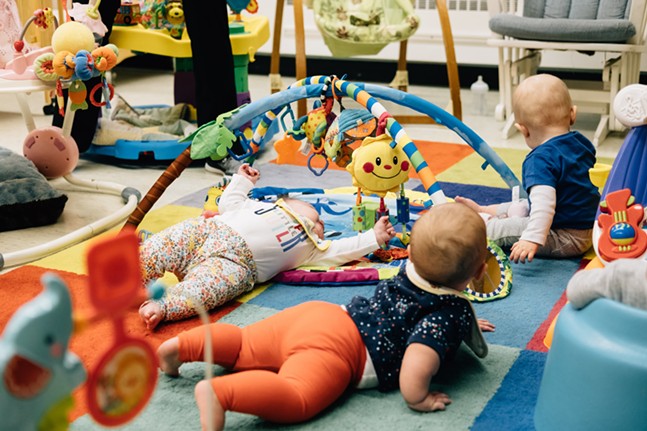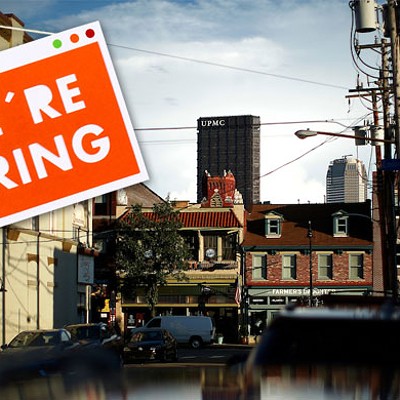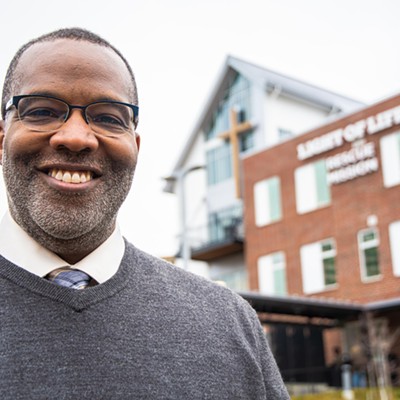Locals see an urgent need for better childcare amid high turnover and empty classrooms
[
{
"name": "Local Action Unit",
"component": "24929589",
"insertPoint": "3",
"requiredCountToDisplay": "1"
}
]
The childcare crisis in America is worsening by the day. Parents face long waitlists and high tuition costs. Program directors face an exodus of early childcare teachers who can no longer survive on poverty-level wages. The average early childcare teacher is food insecure and regularly struggling to pay bills, with a national median pay of $14.60 per hour. Childcare earnings fail to meet the cost of living in all 67 Pennsylvania counties.
Pa.’s 2024-25 budget has allocated money to subsidize some early childcare programs, but the funding was not meant for salaries. To push for further change, early childcare advocacy groups across Pennsylvania have been working together in a statewide coalition called the Early Learning Pa. Coalition. The coalition started the Start Strong Pa. campaign to advocate for more effective public policy solutions. They recently hosted a webinar to highlight the state budget, and the main message was clear: without funding to raise the wages of childcare teachers, the crisis will not only continue, but it will worsen.
Trying Together, an early childhood non-profit in Southwestern Pa., has been on the frontlines of this advocacy effort. Emily Neff, their director of public policy, explains that they want Pa. Gov. Josh Shapiro's administration and the commonwealth's General Assembly to fund a “recruitment and retention initiative” that would specifically allocate funding for childcare teacher salaries but it was not included in the 2024-2025 budget. As it stands, the additional funding allocated in the 2024-2025 budget for early childhood programs won’t reach the workforce because it will cover administrative costs such as food, rent, etc. for childcare providers.
“If you’re looking at this as a supply and demand problem, then the first part of fixing this is to fix the supply side. If we don’t fix the supply side, we can’t fix the demand side. If we don’t have teachers, then the tax credits won’t help because there won’t be any childcare centers for the children to attend,” says Neff. “Childcare directors tell me that they have beautiful rooms sitting empty because they don’t have enough teachers.”
Locals see a growing need, as well. Allegheny County Executive Sara Innamarato's administration conducted the All In Allegheny Community Survey between November 2023 and April 2024. The 19,000 respondents to the survey considered early childcare a priority, with 40% of residents marking “access and affordable childcare” a priority and 31% marking “an increase in pay for childcare teachers” a priority.
Even at the state level, early childcare is a bipartisan issue that residents consider important.
“A poll commissioned by the Early Learning Pa. Coalition and conducted by Susquehanna Polling and Research from Feb. 27 to March 6, 2024, found that 95% of Pa. voters believe that early childhood education is important,” the findings read. “Seventy percent of Pa. voters favor allocating state funding to increase wages of childcare teachers, and 68% of Pa. voters support increasing state funding to help more low-income working families afford high-quality childcare.”
Voters aren't the only ones to consider this a priority. Business chambers throughout the state signed onto a letter asking for additional funding for childcare teacher salaries because businesses are experiencing the effects of the childcare crisis. Experts say the childcare advocacy effort has required a lot of teaching because many people in government were unaware of the reasons for the childcare crisis. Trying Together has also worked with Pittsburgh’s City Council to eliminate obstacles facing childcare providers who wanted to open a home-based childcare program. Sponsored by Councilmembers Deb Gross and Bobby Wilson, the legislation amended the zoning code to make it easier for childcare programs to open in residential neighborhoods.
The cost of a subsidy to raise the salaries of childcare teachers would be an estimated $284 million. Chambers of commerce believe that the cost is worth it as it would allow for a greater number of parents to return to the workforce. If the Shapiro administration adds the line item to the 2025-26 state budget, Pennsylvania would follow 18 other states including Georgia, Illinois, Minnesota, Nebraska, New Mexico, New York, North Carolina, Oklahoma, Tennessee, Virginia, and others who have already allocated money for childcare teacher salaries.
Carol Austin, the Executive Director of First Up, the Philadelphia childcare advocacy group, says that families, teachers, and employers need to make their voices heard.
“We have to advocate for this, day in and day out, until they add this to the budget. This issue is impacting families and employers with employees who are struggling to find quality early childcare. It’s time to make a bold investment in childcare. Children experience the most rapid period of brain development between birth to age 5 — roughly 1 million neural connections form every minute! Early childhood educators care for the child, and the benefits last a lifetime.”
Pa.’s 2024-25 budget has allocated money to subsidize some early childcare programs, but the funding was not meant for salaries. To push for further change, early childcare advocacy groups across Pennsylvania have been working together in a statewide coalition called the Early Learning Pa. Coalition. The coalition started the Start Strong Pa. campaign to advocate for more effective public policy solutions. They recently hosted a webinar to highlight the state budget, and the main message was clear: without funding to raise the wages of childcare teachers, the crisis will not only continue, but it will worsen.
Trying Together, an early childhood non-profit in Southwestern Pa., has been on the frontlines of this advocacy effort. Emily Neff, their director of public policy, explains that they want Pa. Gov. Josh Shapiro's administration and the commonwealth's General Assembly to fund a “recruitment and retention initiative” that would specifically allocate funding for childcare teacher salaries but it was not included in the 2024-2025 budget. As it stands, the additional funding allocated in the 2024-2025 budget for early childhood programs won’t reach the workforce because it will cover administrative costs such as food, rent, etc. for childcare providers.
“If you’re looking at this as a supply and demand problem, then the first part of fixing this is to fix the supply side. If we don’t fix the supply side, we can’t fix the demand side. If we don’t have teachers, then the tax credits won’t help because there won’t be any childcare centers for the children to attend,” says Neff. “Childcare directors tell me that they have beautiful rooms sitting empty because they don’t have enough teachers.”
Locals see a growing need, as well. Allegheny County Executive Sara Innamarato's administration conducted the All In Allegheny Community Survey between November 2023 and April 2024. The 19,000 respondents to the survey considered early childcare a priority, with 40% of residents marking “access and affordable childcare” a priority and 31% marking “an increase in pay for childcare teachers” a priority.
Even at the state level, early childcare is a bipartisan issue that residents consider important.
“A poll commissioned by the Early Learning Pa. Coalition and conducted by Susquehanna Polling and Research from Feb. 27 to March 6, 2024, found that 95% of Pa. voters believe that early childhood education is important,” the findings read. “Seventy percent of Pa. voters favor allocating state funding to increase wages of childcare teachers, and 68% of Pa. voters support increasing state funding to help more low-income working families afford high-quality childcare.”
Voters aren't the only ones to consider this a priority. Business chambers throughout the state signed onto a letter asking for additional funding for childcare teacher salaries because businesses are experiencing the effects of the childcare crisis. Experts say the childcare advocacy effort has required a lot of teaching because many people in government were unaware of the reasons for the childcare crisis. Trying Together has also worked with Pittsburgh’s City Council to eliminate obstacles facing childcare providers who wanted to open a home-based childcare program. Sponsored by Councilmembers Deb Gross and Bobby Wilson, the legislation amended the zoning code to make it easier for childcare programs to open in residential neighborhoods.
The cost of a subsidy to raise the salaries of childcare teachers would be an estimated $284 million. Chambers of commerce believe that the cost is worth it as it would allow for a greater number of parents to return to the workforce. If the Shapiro administration adds the line item to the 2025-26 state budget, Pennsylvania would follow 18 other states including Georgia, Illinois, Minnesota, Nebraska, New Mexico, New York, North Carolina, Oklahoma, Tennessee, Virginia, and others who have already allocated money for childcare teacher salaries.
Carol Austin, the Executive Director of First Up, the Philadelphia childcare advocacy group, says that families, teachers, and employers need to make their voices heard.
“We have to advocate for this, day in and day out, until they add this to the budget. This issue is impacting families and employers with employees who are struggling to find quality early childcare. It’s time to make a bold investment in childcare. Children experience the most rapid period of brain development between birth to age 5 — roughly 1 million neural connections form every minute! Early childhood educators care for the child, and the benefits last a lifetime.”




















